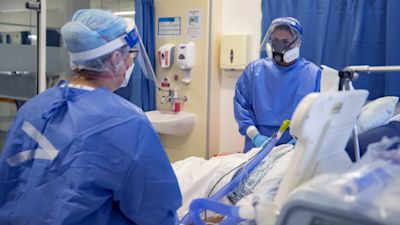Long Covid: 70% of patients still suffering five months after leaving hospital, study reveals

Video report from ITV News Health Editor Emily Morgan
More than half of Covid patients are still suffering after five months of being discharged from hospital, new research shows.
Scientists found seven in ten people (70%) did not fully recover after being hospitalised with coronavirus.
Listen to the latest episode of our Coronavirus podcast, including a special on long Covid and what's being done to help sufferers...
The UK-wide study into long Covid, which is led by the National Institute for Health Research (NIHR) and the University of Leicester reveals the majority of patients who had coronavirus continued to experience negative impacts on their physical and mental health.
The study also revealed one in five of the participant population reached the threshold for a new disability.
Long Covid affects one in five people, new ONS figures suggest
Long Covid: What is it, what are the symptoms and what help is there for sufferers?
Scientists analysed 1,077 patients who were discharged from hospital between March and November 2020 after contracting Covid-19.
Researchers found each participant had an average of nine persistent symptoms including muscle pain, fatigue, physical slowing down, impaired sleep quality, joint pain or swelling, limb weakness, breathlessness, pain, short-term memory loss, and slowed thinking.
What are the symptoms for Long Covid?
Professor Chris Brightling, a professor of respiratory medicine at the University of Leicester and the chief investigator for the PHOSP-COVID study, said white women aged between 40 and 60, who have at least two long-term health conditions, were said to have the most severe prolonged reactions.
He said: "While the profile of patients being admitted to hospital with Covid-19 is disproportionately male and from an ethnic minority background, our study finds that those who have the most severe prolonged symptoms tend to be white women aged approximately 40 to 60 who have at least two long term health conditions, such as asthma or diabetes."
Sandra Moult from Queniborough in Leicestershire described the feelings of fatigue she still continues to endure after contracting Covid-19.
She told ITV News: "I'm still suffering from feeling really fatigued and tired, which is frustrating because I don't have the energy that I used to have.
"[I'm] still getting pains in my back, swollen legs and ankles, which I still don't know if that's related to Covid or not so I'm just waiting to see - I've also had to go on extra blood pressure tablets to overcome that."
Ms Moult continued: "And when I came out of hospital I had mouth ulcers, pains in the back of my ear and that was an ear infection."
"It's just all these little things that you didn't expect when you came out of hospital you start to get a bit better but there are things that make you think it's not going to go back downhill," she added.
Dr Rachael Evans, an associate professor at the University of Leicester and respiratory consultant at Leicester’s Hospitals, said: "Our results show a large burden of symptoms, mental and physical health problems and evidence of organ damage five months after discharge with Covid-19.
"It is also clear that those who required mechanical ventilation and were admitted to intensive care take longer to recover."
She added: "However, much of the wide variety of persistent problems was not explained by the severity of the acute illness - the latter largely driven by acute lung injury - indicating other, possibly more systemic, underlying mechanisms."
Professor Chris Whitty, Chief Medical Officer and co-lead for the National Institute for Health Research, said: "We are in the foothills of our understanding of long term effects of Covid.
"This research provides useful information on the debilitating effects of Covid some people are living with months after being hospitalised.
"It is important that we work out what exactly the various elements of what is currently termed 'Long Covid' are so we can target actions to prevent and treat people suffering with long term effects."
Health Secretary Matt Hancock said he recognises how "long Covid can have a lasting and debilitating impact on the lives of those affected", before adding that he's "determined to improve the care we can provide."
He said: "Studies like this help us to rapidly build our understanding of the impact of the condition and we are working to develop new research so we can support and treat people.
"We are learning more about Long Covid all the time and have given £20 million research funding to support innovative projects, with clinics established across the country to help improve the treatment available."